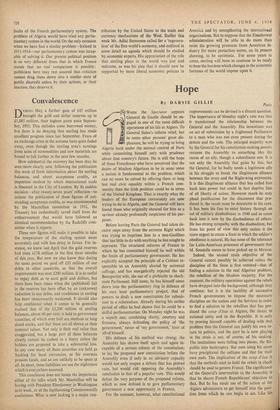Convalescence
DURING May a further gain of £45 million brought the gold and dollar reserves up to £1,085 million, their highest point since Septem- ber, 1951. This includes some borrowed money, but there is no denying that sterling has made excellent progress since last September. Fears of an exchange crisis in the autumn have quite faded away, even though the sterling area's earnings from sales of commodities and raw materials are bound to fall further in the next few months.
How substantial the recovery has been may be seen more clearly now, following the publication this week of fresh information about the sterling balances, and about acceptance credits, an important method by which international trade is financed in the City of London. By its sudden decision—after twenty-seven years' reflection—to initiate the publication of these figures of out- standing acceptance credits, as was recommended by the Macmillan committee in 1931, the Treasury has undoubtedly saved itself from the embarrassment that would have followed an identical recommendation by the Radcliffe com- mittee when it reports.
These new figures will make it possible to take the temperature of the sterling system more accurately and with less delay in future. For in- stance, we knew last April that the gold reserves had risen £178 million in the first three months of this year. But now we also know that during the same period we paid off £33 million of our debts to other countries, so that the overall improvement was over £200 million. It is as useful to repay debt as to earn gold and dollars, but there have been times when the (published) fall in the reserves has been offset by an (unknown) reduction in our debts, and Confidence in sterling has been unnecessarily weakened. It should also help confidence when it comes to be generally realised that of the £3,200 million of sterling balances, about 60 per cent. is held in government securities, of which over half are medium or long dated stocks, and that these are all shown at their nominal values. Not only is their real value thus exaggerated, but a large part of these balances clearly cannot be cashed in a hurry unless the holders are prepared to take a substantial loss. In any case many of these securities are held as backing for local currencies, or for overseas pension funds, and so are unlikely to be spent at all. In short, these liabilities are not the nightmare which is everywhere assumed.
This conclusion does not lessen the importance either of the talks which Mr. Macmillan will be having with President Eisenhower in Washington next week, or of the forthcoming Commonwealth conference. What is now lacking is a major con- tribution by the United States to the trade and currency mechanisms of the West. Earlier this week Mr. Adlai Stevenson called for a 'regenera- tion' of the free world's economy, and outlined in some detail an agenda which should be studied by economic experts. His appreciation of the role that sterling plays in the world was just and welcome, as was his plea that it should now be supported by more liberal economic policies in America and by strengthening the international organisations. But to suppose that the Eisenhower administration will be able to do more than resist the growing pressures from American in- dustry for more protection seems, on its present showing, to be optimistic. For some years to come, sterling will have to continue to be ready to bear the burdens which changes in the economic fortunes of the world impose upon it.










































 Previous page
Previous page